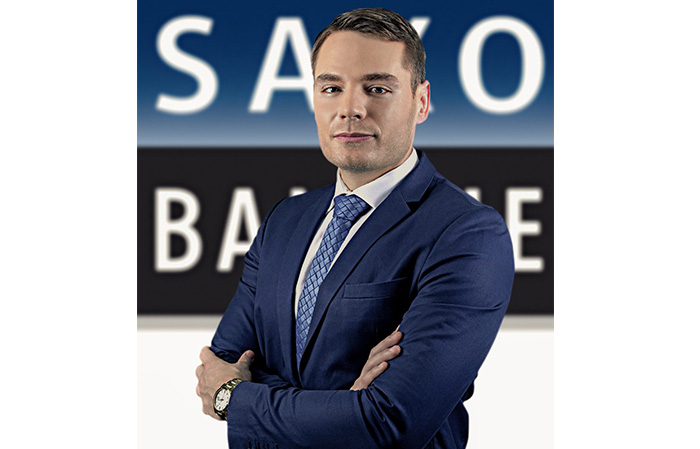Christopher Dembik, Saxo Bank - interview with the speaker of FxCuffs 2017
"Investors slightly disregard Brexit's potential negative impact on the global situation"
Christopher Dembik
Director of Macroeconomic Analysis in Saxo Bank. Previously, he worked for the French Directorate General of the Treasury in Tel Aviv. Often cited by international media on economic issues, he regularly publishes forecasts for the French and Polish economy. Author of the Monthly Macro Review of Saxo Bankwhich has a strong focus on monetary policy.
Forex Club: Can you introduce yourself - what do you do, what are your duties at Saxo Bank and what is your forex experience?
CD: I have joined Saxo Bank in 2014 as an economist at a Paris branch of the bank, and in 2016 I became the head of macro analysts. I first dealt with the forex market in 2008, during a student exchange at Tel Aviv University (Israel). I was then employed by a French-Israeli start up, and my task was to prepare articles with macro analysis on the forex market. From that moment, I began to regularly monitor the currencies and activities of central banks.
Forex Club: You are the director of macroeconomic analysis in Saxo Bank - could you share with us the tools / methods that you usually use when preparing macro analyzes?
CD: In my work, the key issue is to keep up to date with information about markets, central bank activities and political issues. That's why I read a lot, focusing on financial newspapers, central bank analyzes and international organizations, etc. My favorite program for obtaining and analyzing data is Macrobond - I find this program more useful and intuitive than Bloomberg.
Forex Club: Apart from working as an economist, do you invest your own funds in financial markets? If so, which instruments do you use?
I invest in real estate, financial markets, primarily forex and some French companies listed on CAC 40.
Forex Club: There is a general belief among investors in the forex market that fundamental analysis only makes sense in the long term. Do you agree with this statement?
CD: In the short term, the technical analysis is more accurate than the fundamental analysis, there is no doubt about it. However, as an investor and economist, I prefer investing with a long time horizon. I try to use my knowledge and historical analysis (which is always very interesting) to understand how the market can react. Here's a specific example. At present, it may be helpful to analyze the impact of Nixon and Reagan's operations on USD to predict what actions will be taken by Trump for his presidency. Will he be for a stronger dollar, or will he prefer her weakness? To find out about my thoughts on this issue, I invite you to my presentation at the conference - this will be one of the points I will address.
Forex Club: Which political events could have the strongest impact on the financial markets in 2017? Could they be the presidential election in Germany, the general election in the Netherlands or the start of Trump's presidency in the US?
CD: Support for populists is constantly growing and this trend can be confirmed in the case of general elections in the Netherlands. However, they are not the greatest source of anxiety for me. The two key political events will, of course, be Brexit and the Trump presidency. One of my colleagues from Belgium said that Trump was out of his mind. I prefer a more diplomatic statement - I think that he is simply a political opportunist. Due to the fact that he does not have strong beliefs, the next months will be marked by increased volatility in financial markets - nobody is able to say what ideas Trump will try to actually implement and which ones will receive support from Congress. Investors are quite enthusiastic about his investment program, but I doubt that the Republicans would support him because of the greater public debt involved. I am afraid that the "Trump effect" can quickly disappear.
Forex Club: Do you think Brexit should be in the spotlight of investors in 2017? What could be the impact of this process on the CEE region and financial markets?
CD: Of all the political events that await us in the first quarter (the presidential election in Germany 12 February and the general elections in the Netherlands 15 March), the launch of the 50 article by the United Kingdom by the end of March will certainly carry the greatest risk. This is related to the economic strength of the UK and the Eurozone, which account for 15,7% and 3,9% of global GDP, respectively, in dollar terms. Until now, the most visible result of Brexit was the weakening of the pound (although the loss of this currency is also partly caused by a significant current account deficit, which is close to 7% of GDP). GBP lost almost 17% against USD and 9,3% against EUR from 23 in June. I believe that investors are currently slightly disregarding the potential negative impact of Brexit on the global situation, so I would recommend taking great care in the coming months. Of course, Central and Eastern Europe would receive a strong blow in the case of Brexit, because it is a region that is heavily dependent on British investments; this applies in particular to the Czech Republic and Slovakia. In my opinion, the British government will use this economic dependence to guarantee support from the countries of the region during negotiations with Brussels. In return, London will propose to continue its investments in the region. This will be a step that will further weaken cohesion within the EU.
Forex Club: You are one of the guests of the FxCuffs 2017 conference. What will you focus on during your presentation? Could you please name some of the key points that you will be addressing?
CD: First of all, I will tell you about the impact of political events on the market and investments. I will try to answer three key questions in 2017: In which direction is USD heading? Will the euro zone collapse? Does protectionism work?
Forex Club: In 2016, Saxo Bank closed a branch in Warsaw. Do you think that the Polish market has lost its attractiveness recently?
CD: I usually focus on commenting on market issues, but closing a branch in Warsaw was the result of a strategic decision to increase physical presence in some markets, while maintaining close relationships with partners operating in other markets. We have several reliable partners in Poland, so it is one of the markets on which cooperation on the basis of partnership is more sensible for us, and not a local presence on the market characterized by high competitiveness and saturation. Our clients in Poland will not feel any changes regarding the quality of service and interaction with Saxo. The clients are served in Polish by experts with extensive experience.
Forex Club: Thank you for the interview.
Christopher Dembik will be one of the speakers at Expo FxCuffs 2017 in Krakow. Subscribe today, completely free.






















![Forex Club – Tax 9 – Settle tax on a foreign broker [Download the Application] Forex Club - Tax 9](https://forexclub.pl/wp-content/uploads/2024/02/Forex-Club-Podatek-9-184x120.jpg?v=1709046278)
![Trading View platform – solutions tailored to the needs of traders [Review] trading view review](https://forexclub.pl/wp-content/uploads/2024/03/trading-view-recenzja-184x120.jpg?v=1709558918)
![How to connect your FP Markets account to the Trading View platform [Guide] fp markets trading view](https://forexclub.pl/wp-content/uploads/2024/02/fp-markets-trading-view-184x120.jpg?v=1708677291)
![How to invest in ChatGPT and AI? Stocks and ETFs [Guide] how to invest in chatgpt and artificial intelligence](https://forexclub.pl/wp-content/uploads/2023/02/jak-inwestowac-w-chatgpt-i-sztuczna-inteligencje-184x120.jpg?v=1676364263)



![Izabela Górecka – “Success on the market depends not only on knowledge, but also on emotional stability” [Interview] Izabela Górecka - interview](https://forexclub.pl/wp-content/uploads/2024/04/Izabela-Gorecka-wywiad-184x120.jpg?v=1713870578)
![WeWork – the anatomy of the collapse of a company valued at $47 billion [WeWork, part II] wework bankruptcy story](https://forexclub.pl/wp-content/uploads/2024/04/wework-bankructwo-historia-184x120.jpg?v=1711729561)
![Adam Neumann – the man who screwed up Softbank [WeWork, part AND] adam neumann wework](https://forexclub.pl/wp-content/uploads/2024/04/adam-neumann-wework-184x120.jpg?v=1711728724)





![The most common mistakes of a beginner trader - Mr Yogi [VIDEO] Scalping - The most common mistakes of a beginner trader - VIDEO](https://forexclub.pl/wp-content/uploads/2024/03/Scalping-Najczestsze-bledy-poczatkujacego-tradera-VIDEO-184x120.jpg?v=1711601376)
![Learning patience: No position is also a position - Mr Yogi [VIDEO] Scalping - Learning patience - No position is also a position - VIDEO](https://forexclub.pl/wp-content/uploads/2024/03/Scalping-Nauka-cierpliwosci-Brak-pozycji-to-tez-pozycja-VIDEO-184x120.jpg?v=1710999249)
![When to exit a position and how to minimize losses - Mr Yogi [VIDEO] Scalping - When to exit a position and how to minimize losses - VIDEO](https://forexclub.pl/wp-content/uploads/2024/03/Scalping-Kiedy-wyjsc-z-pozycji-i-jak-minimalizowac-straty-VIDEO-184x120.jpg?v=1710336731)





![Learning patience: No position is also a position - Mr Yogi [VIDEO] Scalping - Learning patience - No position is also a position - VIDEO](https://forexclub.pl/wp-content/uploads/2024/03/Scalping-Nauka-cierpliwosci-Brak-pozycji-to-tez-pozycja-VIDEO-300x200.jpg?v=1710999249)












